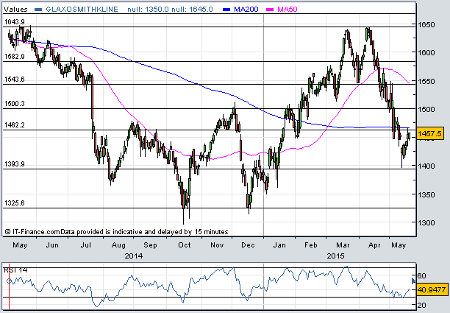Big change to GlaxoSmithKline profit estimates
21st May 2015 13:29
by Lee Wild from interactive investor
Share on
first quarter numbers, published earlier this month, missed consensus estimates - lower sales, higher costs - and the shares fell by as much as 8%. But the drug giant did at least make the generous dividend safe from cuts for the next three years, and growth is forecast to pick up next year. Why then have heavyweight brokers taken such a dim view?
Just a week after reaffirming its 'buy' rating and 1,700p price target, UBS downgraded its stance from 'buy' to 'neutral' and target to 1,500p. That decision was based on a likely deterioration in pharma profits, ex-ViiV, "to a level that may barely cover the cost of capital." Earnings per share (EPS) estimates were slashed by up to 21%.
In what it calls a Q1 "post mortem", broker Jefferies today keeps its 'hold' rating on Glaxo shares, but remains cautious following quarterly results. It also cuts earnings forecasts for the current year by 11% to 77.93p and the target price from 1,520p to 1,450p.
Now, Citigroup has resumed coverage of Glaxo with profit forecasts broadly in line with consensus - look for core EPS of 79.2p, it says - but its slaps a 'neutral' rating on the shares with 1,550p target, down from 1,810p previously.

"While expectations for GSK are low and the stock does not look expensive on our DCF [discounted cash flow] analysis, we continue to struggle to make a compelling positive investment thesis," writes Citi.
"The dividend yield case argued by income fund managers looks weak given GSK's evident over-distribution (particularly on a normalised EPS and cash flow basis). Separately, GSK is negatively impacted by both its inability to compete on a level playing field in China (a material potential market for GSK's respiratory portfolio, as demonstrated by recent AZN gains) as well as 2.5 more years of an onerous US corporate integrity agreement that we have long argued continues to constrain GSK's relative commercial effectiveness in the US compared with peers."
Citi prefers certain US and European peers, among them .
This article is for information and discussion purposes only and does not form a recommendation to invest or otherwise. The value of an investment may fall. The investments referred to in this article may not be suitable for all investors, and if in doubt, an investor should seek advice from a qualified investment adviser.